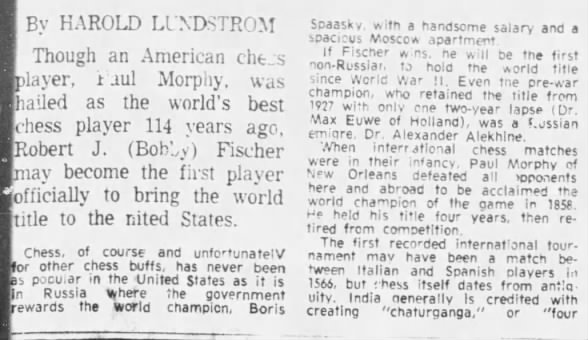< Prev Index Next >
 Let's Play Chess Fri, Mar 31, 1972 – 13 · Deseret News (Salt Lake City, Utah) · Newspapers.com
Let's Play Chess Fri, Mar 31, 1972 – 13 · Deseret News (Salt Lake City, Utah) · Newspapers.com
 Let's Play Chess Fri, Mar 31, 1972 – 13 · Deseret News (Salt Lake City, Utah) · Newspapers.com
Let's Play Chess Fri, Mar 31, 1972 – 13 · Deseret News (Salt Lake City, Utah) · Newspapers.com
USSR Chess Monopoly To End?
Though an American chess player, Paul Morphy, was hailed as the world's best chess player 114 years ago, Robert J. (Bobby) Fischer may become the first player officially to bring the world title to the United States.
Chess, of course and unfortunately for other chess buffs, has never been as popular in the United States as it is in Russia where the government rewards the world champion, Boris Spassky with a handsome salary and a spacious Moscow apartment.
If Fischer wins, he will be the first non-Russian to hold the world title since World War II. Even the pre-war champion, who retained the title from 1927 with only one two-year lapse (Dr. Max Euwe of Holland), as a Russian emigre, Dr. Alexander Alekhine.
When international chess matches were in their infancy, Paul Morphy of New Orleans defeated all opponents here and abroad to be acclaimed the world champion of the game in 1858. He held his title four years, then retired from competition.
The first recorded international tournament may have been a match between Italian and Spanish players in 1566, but chess itself dates from antiquity. India generally is credited with creating “chaturanga,” or “four arms,” the game that evolved into today's chess.
In the Indian version, the king and his counselor took the field flanked by elephants, calvary, and chariots. The fourth arm of the army, the foot soldiers, were ranged in front.
Victorious Persian armies took the game home with them. Checkmate, signaling the end of the game, comes from the Persian “shah mat,” meaning “the king is dead.”
Moslem conquerors learned the game in the 7th Century and it traveled with them to Spain. Because the Koran forbade images they substituted abstract pieces for the carved figures previously used.
Pieces whose V-cut tops were supposed to suggest elephant tusks looked like bishops' miters to European eyes, and became the “bishops.” The war chariots were turned into boasts in Russia and towers in Europe.
The counselor was a messenger, a wise man, or a court jester before it became a queen. A rule changed allowing a pawn advanced to an opponent rear rank to be promoted to queen, alarmed purists in the Middle Ages.
Chess players in China were more pragmatic. In the Chinese game a captured pawn is dead, as is true everywhere. But a captured general goes back into play — now working for the other side.
Chess frequently has involved high stakes and tempers, and was described by a 17th Century writer as “a testy cholericke game and very offensive to him that looseth the mate.”






















